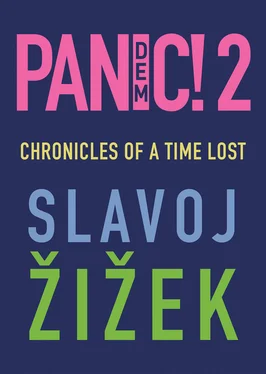The main form of the new exploitation that characterizes work in the conditions of the pandemic (in the West) is, to quote Simon again, “the shifting of costs to workers. From people having no sick leave, to teachers using their broadband and laptops at home to teach, households are performing all reproductive and productive labour.” In these conditions, it is no longer primarily the capitalist who owns the means of production and hires workers to operate them: “the worker brings with her the means of production. Directly, this happens with the Amazon delivery person or Uber driver bringing to work their own car, filled up with gasoline, with insurance and driver’s license all taken care of.” Simon evokes the poster held by Sarah Mason at an anti-lockdown protest: “Social Distancing Equals Communism.” What we get when distancing is abolished is this apparent “freedom” of workers who own their means of production and run around on errands for the company while risking infection. The paradox here is that both of the main variants of the corona-economy—working at home in lockdown and running deliveries of things like food and packages—are similarly subsumed to capital and imply extra-exploitation.
So our reply to Sarah Mason should be: yes, and that’s why we need social distancing. But what we need even more is a new economic order that will allow us to avoid the debilitating choice between economic revival and saving lives.
1 1. https://www.welt.de/vermischtes/article210530869/Streeck-zu-Corona-Infektionen-Keine-zweite-oder-dritte-Welle-wir-sind-in-einer-Dauerwelle.html
2 2. https://www.ecowatch.com/greta-thunberg-2646241937.html
3 3. https://www.theguardian.com/environment/2020/jun/17/climate-crisis-alarm-at-record-breaking-heatwave-in-siberia
4 4. https://socialtextjournal.org/periscope_article/the-sign-language-of-the-tiny-hands-of-the-market/
4. WHY DESTROYING MONUMENTS IS NOT RADICAL ENOUGH
It was widely reported in our media how on June 21, German authorities were shocked over a rampage of an “unprecedented scale” in the center of Stuttgart: four to five hundred partygoers ran riot overnight, smashing shop windows, plundering stores, and attacking police. Police (who needed four and a half hours to quell the violence) ruled out any political motives for these “civil war-like scenes,” describing the perpetrators as people from the “party scene or events scene”. 1With bars and clubs remaining closed as a result of the Covid-19 pandemic, rioting broke out in public. Such incidents are not limited to Germany. On June 25, thousands packed England’s beaches, ignoring social distancing. As one news site reported, “The area was overrun with cars and sunbathers, leading to gridlock. Rubbish crews also suffered abuse and intimidation as they tried to remove mountains of waste from the seafront and there were a number of incidents involving excessive alcohol and fighting.” 2One can easily discern in such violent outbursts a reaction to the immobility imposed by social distancing and quarantine—it is reasonable to expect that more acts like these will follow all around the world, and one should not restrain oneself from voicing the suspicion that the explosive worldwide anti-racist passion, although it is not just an outburst of meaningless violence but an expression of a progressive cause, obeys a similar logic: thousands threw themselves into anti-racist protests with a kind of relief that they were again able to tackle something that is not a stupid virus but “just” a social struggle with a clear enemy.
We are, of course, dealing here with very different types of violence. On the beaches of Bournemouth, people simply wanted to enjoy their usual summer vacation and reacted violently against those who wanted to prevent this. In Stuttgart, the enjoyment was generated by looting and destruction, i.e. by violence itself—this was a violent carnival at its worst, an explosion of blind rage with no clear emancipatory potential (although, as expected, some Leftists tried to read into it a protest against consumerism and police control). The (largely non-violent) anti-racist protests ignored the orders and prohibitions of public authorities on behalf of their struggle for a noble emancipatory cause. (These types of violence predominate in developed Western societies—we ignore here the most massive forms of violence that are already happening and will certainly explode in Third World countries like Yemen, Afghanistan, and Somalia. As the Guardian reported on June 27, “This summer will usher in some of the worst catastrophes the world has ever seen if the pandemic is allowed to spread rapidly across countries already convulsed by growing violence, deepening poverty and the spectre of famine.” 3)
There is a key feature shared by the three types of violence in spite of their differences: none of them expresses a mini-mally-consistent socio-political program. It may appear that the anti-racist protests meet this criterion, but they fail insofar as they are dominated by the Politically Correct passion to erase traces of racism and sexism—a passion that gets all too close to its opposite, the neoconservative thought-control. A law approved on June 16 by Romanian lawmakers prohibits all educational institutions from “propagating theories and opinions on gender identity according to which gender is a separate concept from biological sex”. 4Even Vlad Alexandrescu, a centerright senator and university professor, noted that with this law “Romania is aligning itself with positions promoted by Hungary and Poland and becoming a regime introducing thought policing”. 5Directly prohibiting gender theory is of course an old part of the program of populist new Right, but it has been given a new push by the pandemic: a typical new Right populist reaction to the pandemic is that its outbreak is ultimately the result of our global society in which multiculturalism and non-binary pluralism predominate—the way to fight it is, therefore, to make our societies more nationalist, rooted in a particular culture with firm traditional values.
Let’s leave aside the obvious counter-argument that the pandemic is ravaging fundamentalist countries like Saudi Arabia and Qatar, and focus on the procedure of “thought policing” whose ultimate expression was the infamous Index Librorum Prohibitorum (List of Prohibited Books), a list of publications deemed heretical or contrary to morality by the Sacred Congregation of the Index, and which Catholics were therefore forbidden to read without permission. This list was operative (and regularly renovated) from early modernity until 1966, and everyone who counted in European culture was, at some point, included—in philosophy from Descartes and Kant, to Sartre and de Beauvoir. As my friend Mladen Dolar noted some years ago, if you imagine European culture without all of the books and authors that were at some point on the list, what remains is a wasteland. The reason I mention this is that I think the recent urge to cleanse our culture and education of all traces of racism and sexism courts the danger of falling into the same trap as the Catholic Church’s index: what remains if we discard all authors in whom we find some traces of racism and anti-feminism? Quite literally all the great philosophers and writers disappear.
Let’s take Descartes, who was at one point on the Catholic index but is also widely regarded as the philosophical originator of Western hegemony, which is immanently racist and sexist. We should not forget that the grounding experience of Descartes’s position of universal doubt is precisely a “multicultural” experience of how one’s own tradition is no better than what appears to us as the “eccentric” traditions of others: as he wrote in his Discourse on Method , he recognized in the course of his travels that traditions and customs that “are very contrary to ours are yet not necessarily barbarians or savages, but may be possessed of reason in as great or even a greater degree than ourselves.” This is why, for a Cartesian philosopher, ethnic roots and national identity are simply not a category of truth . This is also why Descartes was immediately popular among women: as one of his early readers put it, cogito —the subject of pure thinking—has no sex. Today’s claims about sexual identities as socially constructed and not biologically determined are only possible against the background of the Cartesian tradition—there is no modern feminism and anti-racism without Descartes’s thought. So, in spite of his occasional lapses into racism and sexism, Descartes deserves to be celebrated, and we should apply the same criterion to all great names from our philosophical past: from Plato and Epicurus to Kant and Hegel, Marx and Kierkegaard. Modern feminism and anti-racism emerged out of this long emancipatory tradition, and it would be sheer madness to leave this noble tradition to obscene populists and conservatives.
Читать дальше












